PREVIOUS
Initiatives of COP 28 Summit
(இதன் தமிழ் வடிவத்திற்கு இங்கே சொடுக்கவும்)
Other Initiatives of COP 28 - 1
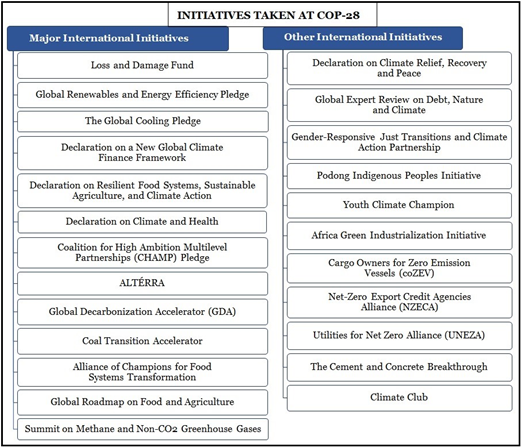
Green Credit Initiative
- India launched the Green Credit Initiative at COP28.
- It aims to create a participatory global platform for exchange of innovative environmental programs and instruments.
- There are two main priorities of the initiative are water conservation and afforestation.
- India described the Green Credit scheme as non-commercial.
- It aims to incentivize voluntary environmental actions across sectors.
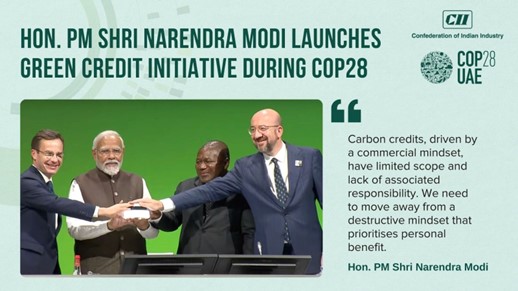
- It will be a non-commercial effort to create a carbon sink.
- The main purpose of this initiative is to boost voluntary environmental activities like tree plantation, water conservation, sustainable agriculture, and waste management by incentivizing it for big corporations and private companies.
- It is bringing about a change in the climate issues faced by the country.
- It envisions the issue of Green Credits for plantations on waste/degraded lands and river catchment areas, to rejuvenate and revive natural ecosystems.
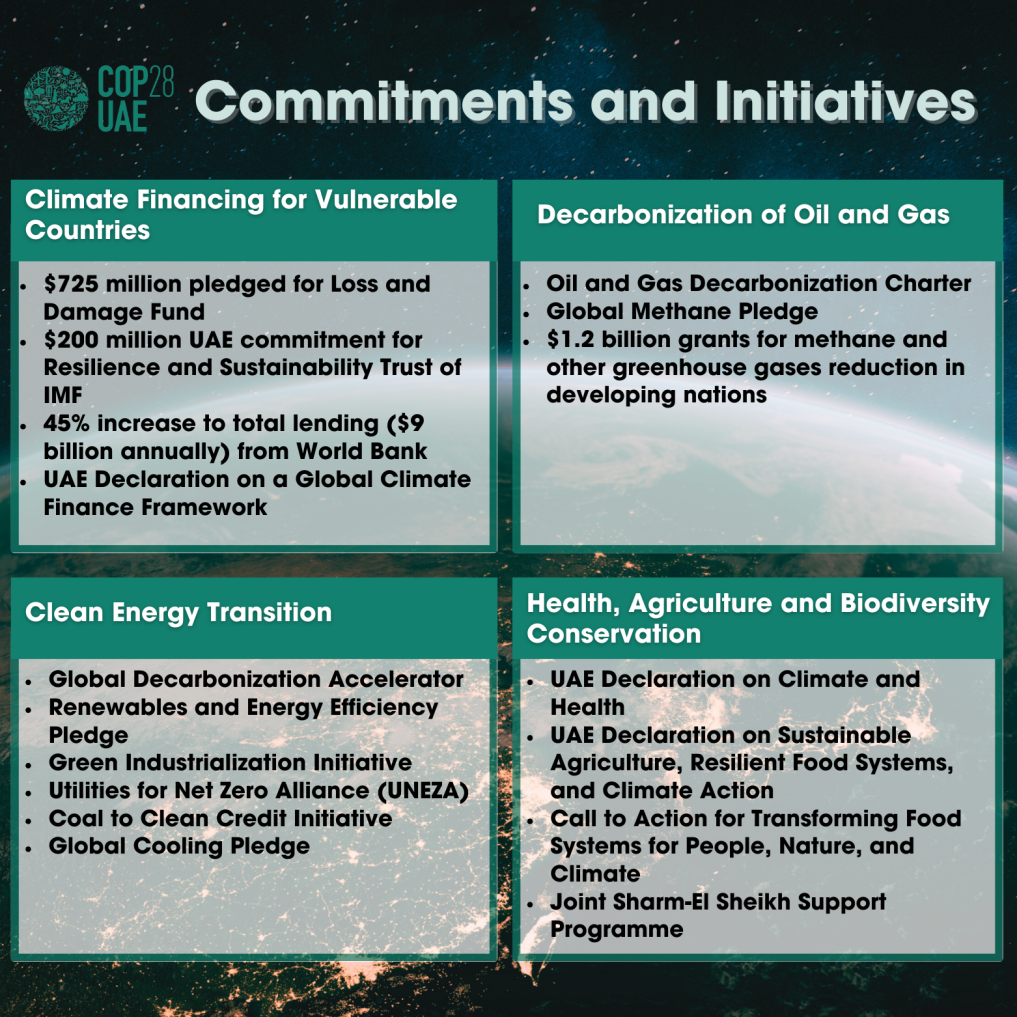
Loss and Damage Fund
- The 'Loss and Damage' (L&D) fund is a financial mechanism.
- The Member countries reached an agreement to operationalize the Loss and Damage (L&D) fund aimed at compensating countries grappling with climate change impacts.
- A specific percentage is earmarked for Least Developed Countries and Small Island Developing States.
- The World Bank will oversee the loss and damage fund in the beginning.
- The World Bank will be the "interim host" of the fund for four years, aligning with UNFCCC and the Paris Agreement.
- All developing countries are eligible to apply, and every country is invited to contribute voluntarily.
- This fund recognizes and aims to compensate for the real losses incurred by communities, countries, and ecosystems due to the impacts of climate change.
- These losses extend beyond monetary value and cut to the core of human rights, well-being, and environmental sustainability.
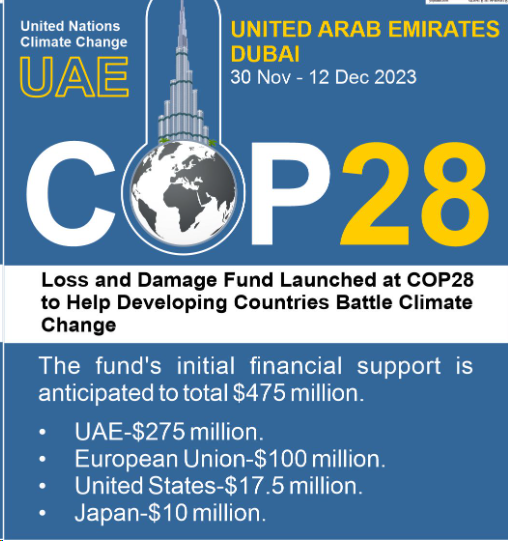
WHO’s Agenda at COP28
- The United Nations Conference of Parties (COP) has a dedicated day on Health/Relief, Recovery, and Peace.
- The day was hosted by the COP28 Presidency and the World Health Organization (WHO).
- It features the first-ever climate-health ministerial, bringing together over 50 ministers from health, environment, and other sectors.
Three Key Calls by WHO at COP28
- Director-General of WHO, Tedros Adhanom Ghebreyesus, highlights three crucial calls at COP28:
Phase Out Fossil Fuels
- He was urging the nations to transition away from fossil fuels to combat climate change.
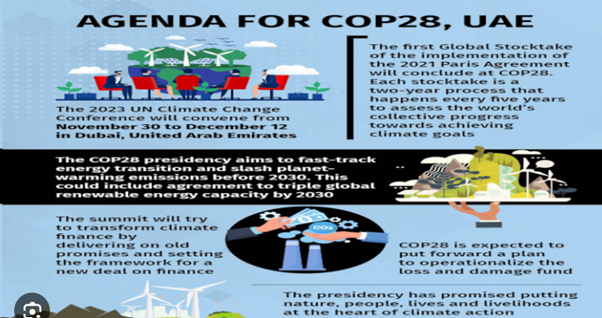
Strengthen Climate Resilience of Health Systems
- He was emphasizing the need to build climate-resilient health systems.
- It is including workforce strengthening and disease surveillance.
Redirect Fossil Fuel Subsidies to Health
- He was calling for redirecting funds from fossil fuel subsidies to the health sector.
- Despite the health sector being at the forefront of the climate crisis, it receives only half a percent of global climate financing.
- Ghebreyesus called for redirecting funds and urges high-income countries to honor their $100 billion support pledge.
The Global Renewables and Energy Efficiency Pledge
- The Pledge stipulates that signatories commit to work together to triple the world’s installed renewable energy generation capacity to at least 11,000 GW by 2030.
- It also calls for collectively double the global average annual rate of energy efficiency improvements from around 2% to over 4% every year until 2030.
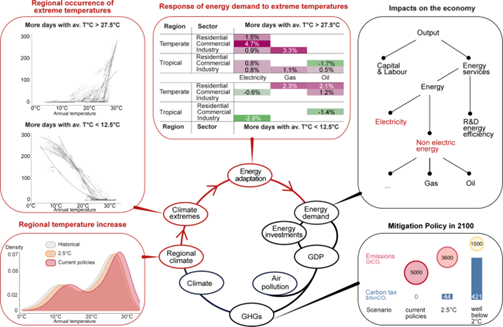
ALTÉRRA Fund
- UAE President Sheikh Mohammed Bin Zayed Al Nahyan launched this at the COP28 climate summit in Dubai.
- He announced the creation of a $30 billion climate fund named ALTÉRRA.
- The fund aims to attract $250 billion in investment by the end of the decade, with $25 billion allocated to climate strategies and $5 billion to incentivize investment in the Global South.
- The fund seeks to steer private markets towards climate investments, especially in emerging markets and developing economies.
- The term “Alterra” typically refers to a Latin word.
- It is often used in various contexts to signify alteration, transformation, or variation.
The fund’s investments will be guided by four key pillars
- 1) Energy Transition
- 2) Industrial Decarbonization
- 3) Sustainable Living
- 4) Climate Technologies Top of Form
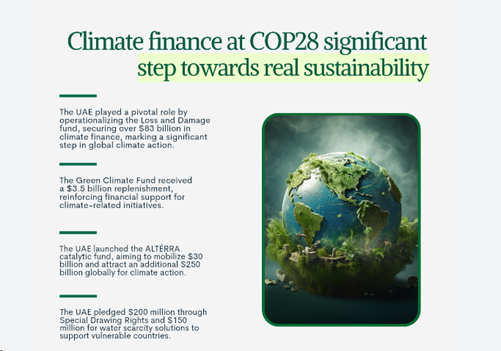
Green Industrialisation Initiative
- The African leaders launched the Green Industrialisation Initiative.
- It is aiming to accelerate green growth in African industries and attract finance and investments.
- The initiative builds on the existing $4.5 billion Africa green investment from the UAE.
- It highlights the continent’s priorities for industrial transition and the need for equitable partnerships.
- The leaders have emphasized the importance of de-risking and developing long-term plans for green industrialization.
- Djibouti aspires for 100% green energy, and Zambia stressed the importance of a shared resource pool for the continent’s benefit.
- The initiative aims to position Africa as a global supplier of green energy and resources.
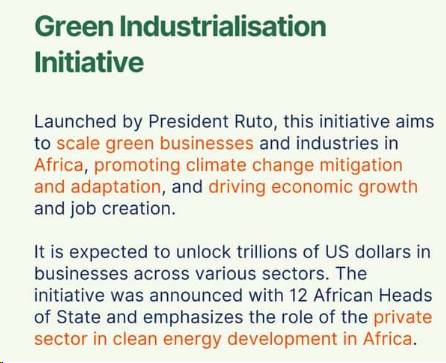
UNEP Report on Sustainable Cooling
- The United Nations Environment Programme (UNEP) has proposed an action plan aimed at significantly reducing emissions from global cooling sector.
- Its recent report is titled “Keeping it Chill: How to meet cooling demands while cutting emissions.”
- This initiative carries the potential to make a substantial impact on the predicted 2050 greenhouse gas emissions, reducing them by 60%.
- The report is released in support of the Global Cooling Pledge.
- It is a joint initiative between the United Arab Emirates as host of the Conference of Parties (COP28) and the Cool Coalition.
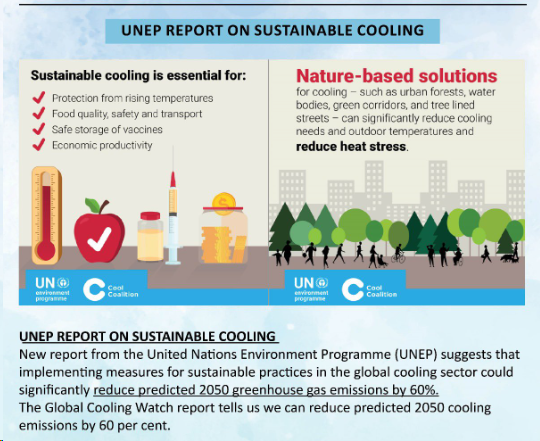
New Collective Quantified Goal (NCQG) on Climate Finance
- The United Nations Conference on Trade and Development (UNCTAD) estimates that wealthy nations owe developing countries USD 500 billion in 2025 under the New Collective Quantified Goal (NCQG) for climate finance.
- The NCQG was confirmed by developed countries under the Paris Agreement in 2015.
- The goal is to set a new collective quantified goal before 2025.
- The goal will start from a floor of USD 100 billion per year.
- This includes USD 250 billion for mitigation, USD 100 billion for adaptation, and USD 150 billion for loss and damage.
- The figure is expected to increase to USD 1.55 trillion by 2030.
- The current climate finance goal of USD 100 billion per year has not been met, and developing countries are facing debt distress.
- The Experts call for reform of the global financial architecture to address structural issues and promote sustainable development.
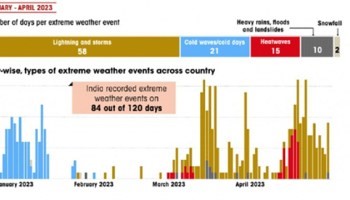
Global Carbon Emission Projections for 2023
- The EGR is UNEP's spotlight report launched annually in advance of the Annual Climate negotiations.
- The EGR tracks the gap between where global emissions are heading with current country commitments and where they ought to be to limit warming to 1.5°C.
The Key Highlights of the Report
Temperature Rise Trajectory
- The Paris Agreement set the world on a course for a 2.5-2.9°C temperature rise above pre-industrial levels by the end of this century.
- Paris Agreement (also known as the Conference of Parties 21 or COP 21) is a landmark environmental accord.
- It was adopted in 2015 to address climate change and its negative impacts.
- To limit warming to 1.5-2°C, substantial emission cuts of 28-42% by 2030 are necessary.
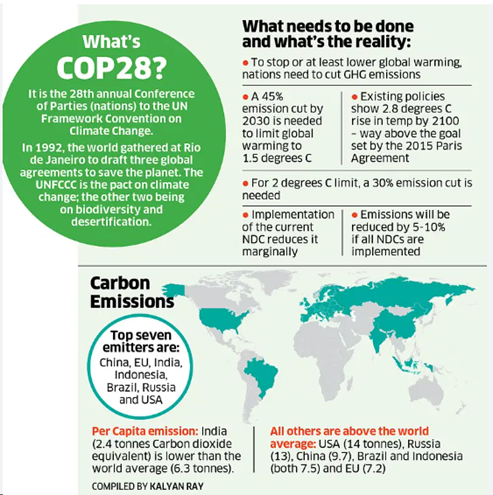
Equitable Phaseout of Fossil Fuel Extraction Report
- A recent report, unveiled at the 28th Conference of Parties (COP28) to the United Nations Framework Convention on Climate Change, calls for Canada to cease fossil fuel extraction by the early 2030s.
- The report emphasizes the urgency of this action and addresses concerns about the developed world’s failure to meet its “fair share” of emissions reductions.
- The report, titled “Equitable Phaseout of Fossil Fuel Extraction,” urges developed nations to exceed the ambition stated in their Nationally Determined Contributions (NDC).
- The 2023 Production Gap Report raises concerns that companies and countries are on track to extract more than twice the amount of fossil fuels by 2030 than is consistent with the 1.5°C pathways.
- This report emphasizes the gap between fair share and actual emissions.
- It is revealing that the United States, in particular, had a 6.5 giga tonnes excess emissions above its fair share in 2015-2022, far exceeding India’s 400 mega tonnes despite its larger population.
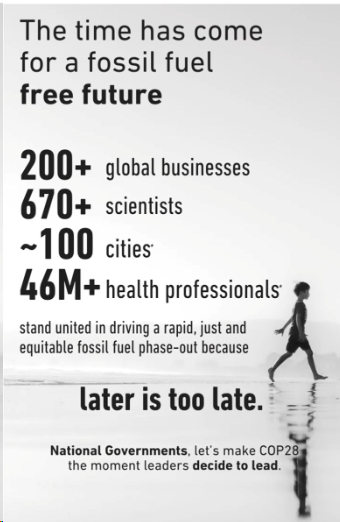
Other Initiatives of COP 28 - 2
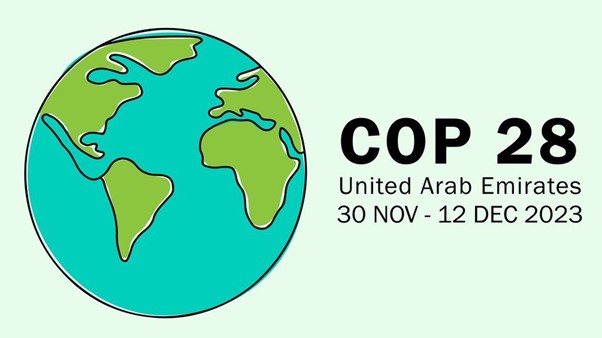
Declaration on Climate and Health
- The declaration calls for climate action to achieve benefits for health from deep, rapid, and sustained reductions in greenhouse gas emissions.
- It is including from transitions, lower air pollution, active mobility, and shifts to sustainable healthy diets.
- The declaration has been signed by 124 countries.
- Till now, the US and India, which are among the top greenhouse gas emitters, are absent from the list of signatories.
- The declaration is aimed at addressing the critical intersection between climate change and global health.
- It emphasises the need for swift and substantial reductions in greenhouse gas emissions.
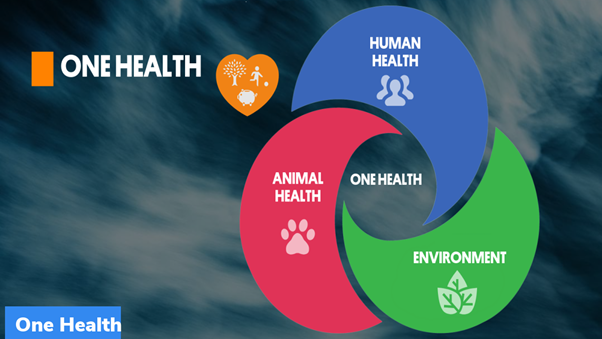
India - BESS
- India has officially become a member of the Battery Energy Storage Systems (BESS) consortium.
- It is an ambitious initiative launched by the Global Leadership Council of the Global Energy Alliance for People and Planet (GEAPP).
- The primary objective of the consortium is to achieve a combined commitment of 5 GW of Battery Energy Storage Systems by the end of 2024.
- In addition to India’s participation, GEAPP has unveiled plans to expand its BESS projects in the country.
- By 2026, the GEAPP aims to reach a 1 GW BESS target for distribution companies in India.
- The first BESS project, with a capacity of 20 MW/40 MWh, was recently awarded to IndiGrid in Delhi.
- GEAPP is set to offer subsidized debt financing covering 70 percent of the overall capital investment.
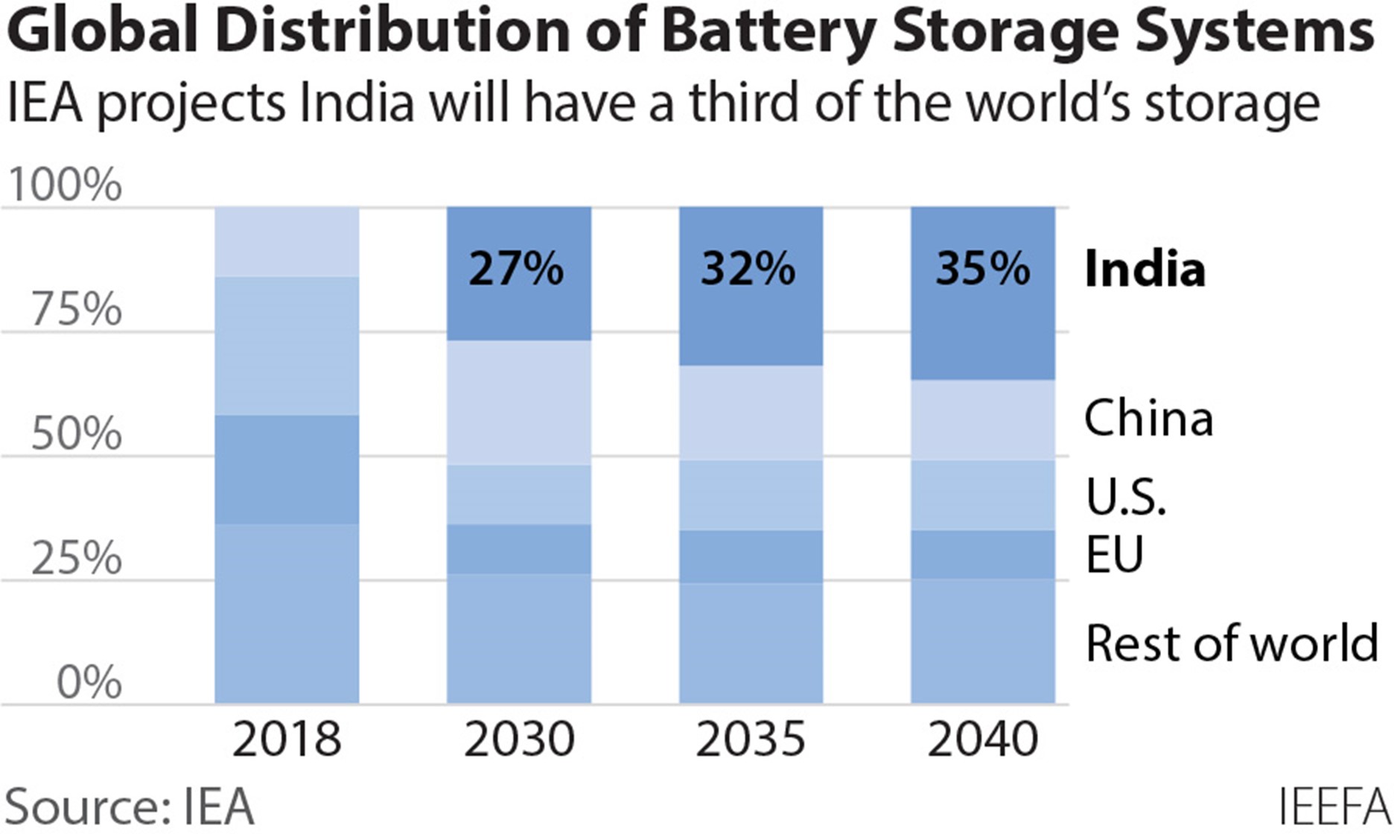
UNICEF 2023 Global snapshot on HIV and AIDS
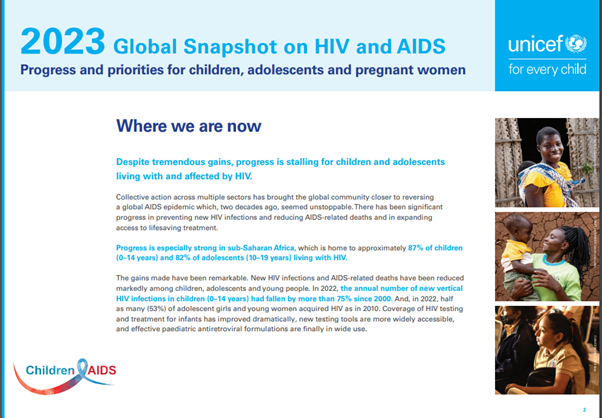
- Nearly 98,000 adolescent girls aged 10-19 were infected with HIV in 2022 – or 1,900 new infections every week.
- It was according to UNICEF’s latest Global Snapshot on Children with HIV and AIDS, recently released ahead of World AIDS Day.
- While total infections among girls aged 10-19 have almost halved since 2010 – from 190,000 to 98,000.
- But girls were still more than twice as likely to contract HIV last year, than boys.
- Globally, there were 270,000 new HIV infections among all children and adolescents aged 0-19 in 2022.
- It is bringing the total number of young people living with HIV to 2.6 million.
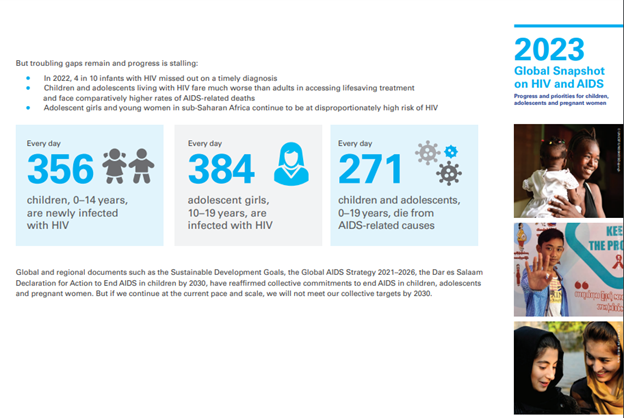
Global Goal on Adaptation (GGA)
- The draft text on the Global Goal on Adaptation (GGA) was introduced.
- It was established under the Paris Agreement to enhance climate change adaptation.
- It aims to increase the awareness of and funding towards countries adaptation needs in the context of the 1.5/2°C goal of the Paris Agreement.
- Global adaptation goal focuses on enhancing adaptive capabilities, and minimizing vulnerability for sustainable development.
- At COP28, this text calls for a doubling in adaptation finance and plans for assessments and monitoring of adaptation needs in the coming years.
- It has been integrated into the text for targets on water security, ecosystem restoration, and health.
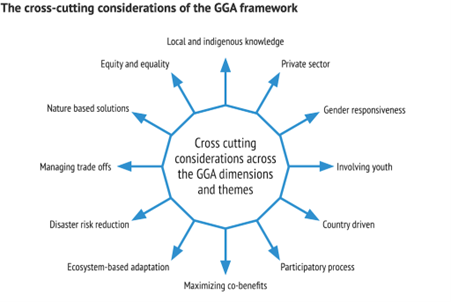
Climate Finance
- The United Nations Conference on Trade and Development (UNCTAD) estimates that wealthy nations owe developing countries USD 500 billion in 2025 under the New Collective Quantified Goal (NCQG) for climate finance.
- The goal is to set a new collective quantified goal before 2025.
- The goal will start from a floor of USD 100 billion per year.
- This includes USD 250 billion for mitigation, USD 100 billion for adaptation, and USD 150 billion for loss and damage.
- The NCQG was confirmed by developed countries under the Paris Agreement in 2015.
- The figure is expected to increase to USD 1.55 trillion by 2030.
- The current climate finance goal of USD 100 billion per year has not been met.
- And developing countries are facing debt distress.
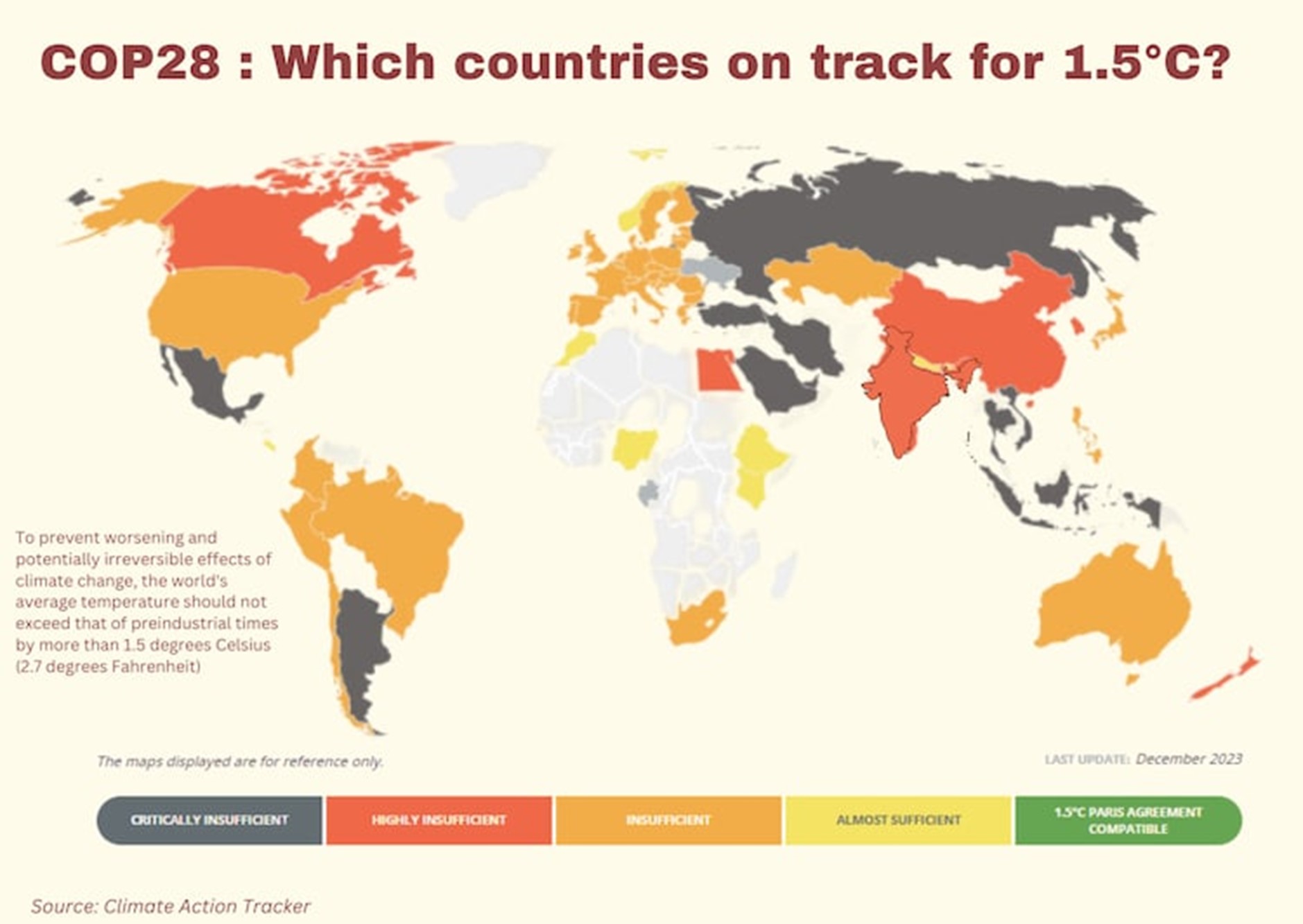
The draft text addresses critical issues
- Climate-Induced Water Scarcity Reduction.
- Climate-resilient food and Agriculture Production.
- Strengthening Resilience Against Climate-Related Health Impacts.

Global Drought Snapshot - UNCCD
- The Global Drought Snapshot report highlighted that only a few hazards claim more lives, cause more economic loss, and affect more sectors of society than drought.
- According to UNCCD, 1.84 billion people were drought-stricken, out of which 4.7 percent were exposed to severe or extreme drought.
- According to the World Bank, around 85% of people affected by droughts live in low or middle-income countries.
- Around 23 countries (including India) declared drought emergencies at a national or sub-national level during 2022-23.
- According to new data from a global drought map compiled by the United Nations.
- The year 2023 has broken records when the world breached 2 degrees Celsius of warming on November 17, 2023.
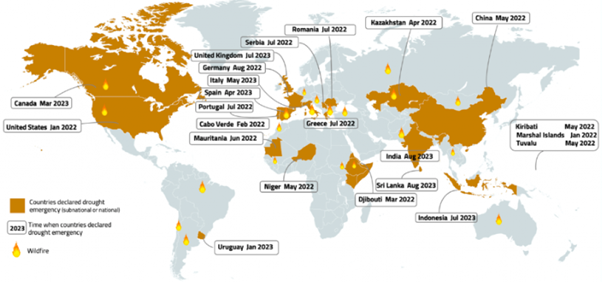
Allied Climate Partners: COP28
- At COP28, Allied Climate Partners joined the International Finance Corporation in a climate financing venture to try to generate $11 billion in investments in developing countries.
- Allied Climate Partners is a philanthropic investment organisation.
- It is with a mission to increase the number of bankable, climate-related projects and businesses in emerging markets and developing economies.
- It aims to create significant environmental, economic, and social impact.
- Its initial focus regions are Southeast Asia, the Caribbean and Central America, Africa, and India.
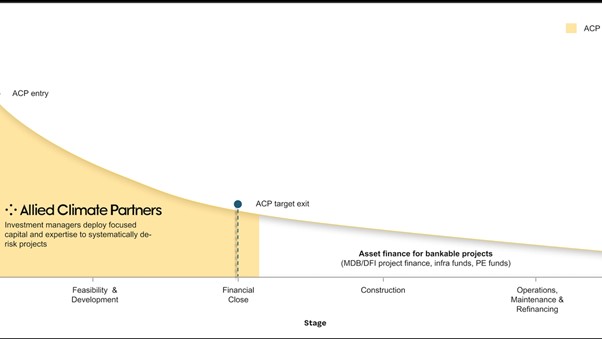
Launch of LeadIT 2.0
- The Leadership Group for Industry Transition (LeadIT) Summit 2023 was hosted by India and Sweden at the Conference of Parties (COP 28) in the United Arab Emirates.
- The Ministry of Environment, Forest and Climate Change announced the three pillars of the second phase of LeadIT (2.0).
- LeadIT is a global initiative.
- It aims to accelerate the transition of challenging sectors such as steel, cement, chemicals, aviation, and shipping to low-carbon pathways.
- The LeadIT gathers countries and companies that are committed to action to achieve the Paris Agreement.
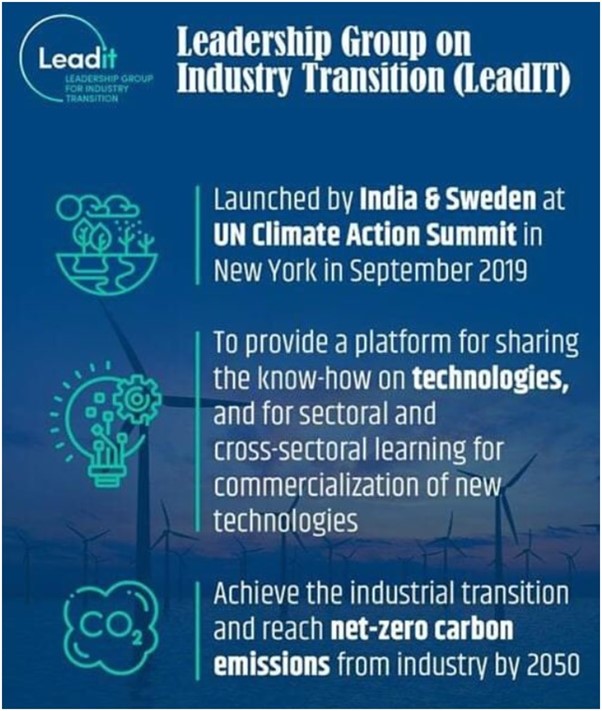
- It was launched by the governments of Sweden and India at the United Nations Climate Action Summit in 2019.
- It is supported by the World Economic Forum.
- LeadIT, boasting 38 members, encompasses countries and companies.
- Notably, India is an active participant.
- LeadIT members subscribe to the notion that energy-intensive industries can and must progress on low-carbon pathways.
- It is aiming to achieve net-zero carbon emissions by 2050.
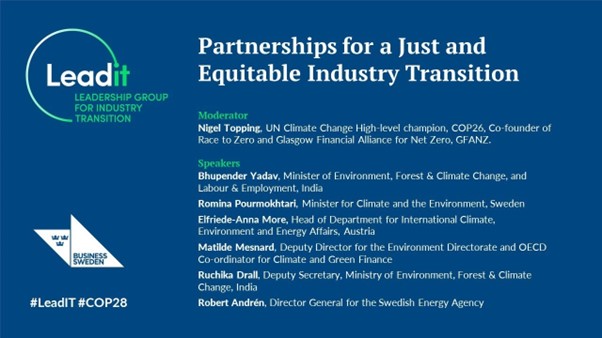
Climate Champions
- Michelle Zárate Palomec and Sebastian Mwaura win UN Awards.
- Amidst the global efforts to combat climate change, two remarkable individuals, Michelle Zárate Palomec from Mexico and Sebastian Mwaura from Kenya, were honored as winners of the UN Global Climate Action Awards.
- Their outstanding contributions were aimed at creating sustainable, resilient, and equitable communities.
- It was celebrated during the upcoming UN Climate Change Conference COP28 in Dubai.
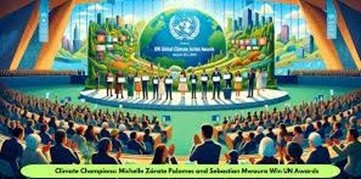
Agriculture’s 40% Impact on Global Climate
- A recent analysis by the United Nations (UN) reveals that agriculture stands out as the most climate-affected sector globally, with 40% of countries experiencing economic losses directly tied to it.
- This report was released by the UN Food and Agriculture Organization (FAO) on December 1, 2023.
- It adds significant weight to the ongoing discussions at the 28th Conference of Parties (COP28) to the United Nations Framework Convention on Climate Change (UNFCCC) in Dubai, UAE.
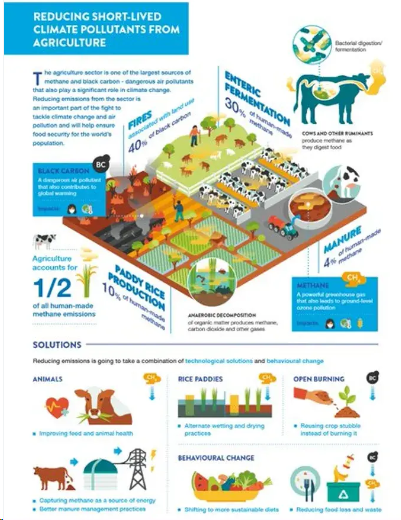
- The FAO report delves into the Nationally Determined Contributions (NDCs) of 168 countries under the 2015 Paris Agreement.
- Shockingly, it reveals that agriculture is the single most impacted area, explicitly mentioned in one-third (35%) of current climate action plans.
- Strikingly, three-fourths of countries highlighting loss and damage are middle-income nations, predominantly in Latin America and the Caribbean, East Asia and the Pacific, and Europe and Central Asia.
- The analysis made a critical distinction between economic and non-economic losses.
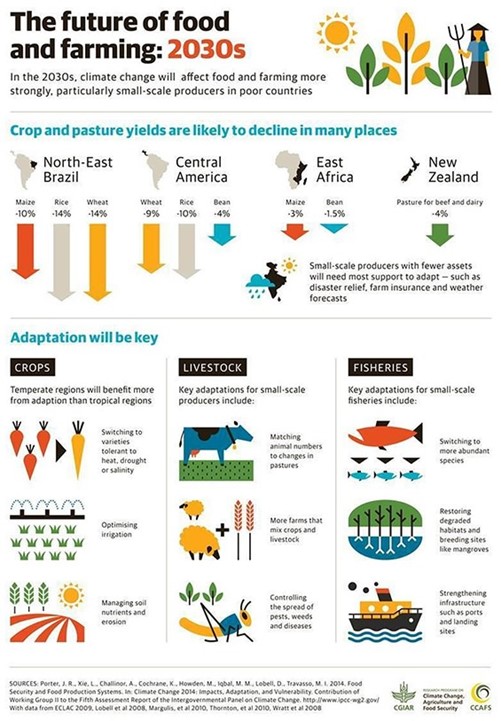
- While 33% of non-economic losses are related to the agricultural sector.
- But surprisingly, agriculture has not been a primary focus in discussions surrounding loss and damage and climate finance.
- The agrifood sector, employing over 866 million people globally and representing a $3.6 trillion turnover in 2020, remains a cornerstone in global systems.
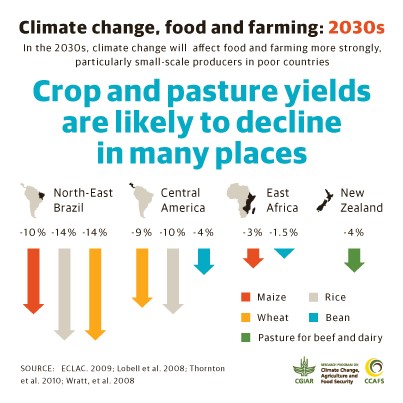
Other Initiatives of COP 28 - 3
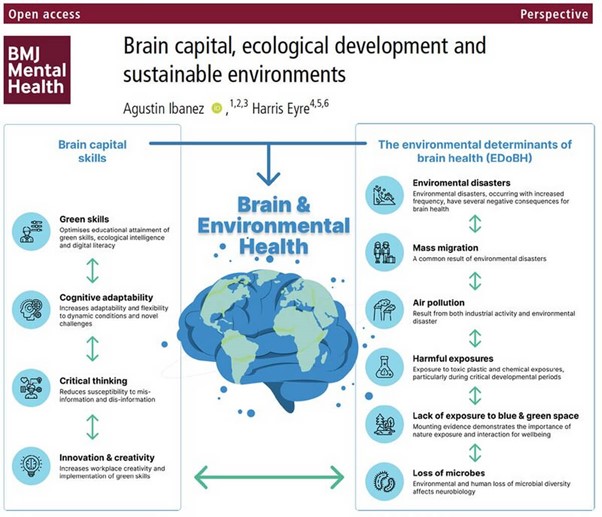
Global Climate report
- The World Meteorological Organization (WMO) has released the State of the Global Climate Report 2022.
- The report focuses on key climate indicators – Greenhouse Gasses, Temperatures, Sea level rise, Ocean Heat and Acidification, Sea ice and Glaciers.
- It also highlights the impacts of climate change and extreme weather.
- Earlier, the WMO released the provisional State of the Global Climate report, 2022.
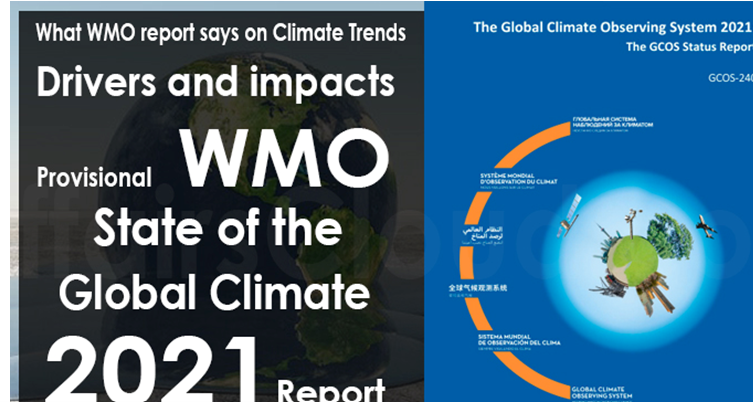
The Findings of the Report
- Global mean temperature in 2022 was 1.15 °C above the 1850-1900 average.
- This was despite three consecutive years of a cooling La Niña.
- Such a “triple-dip” La Niña has happened only three times in the past 50 years.
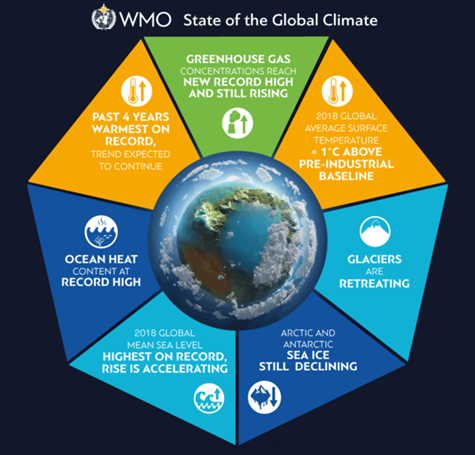
Global River Cities Alliance (GRCA)
- It was launched at COP 28, led by the National Mission for Clean Ganga (NMCG) under the Ministry of Jal Shakti, Government of India.
- The GRCA is a unique alliance covering 275+ global river-cities in 11 countries.
- Partner countries include Egypt, Netherlands, Denmark, Ghana, Australia, Bhutan, Cambodia, Japan and river-cities of The Hague (Den Haag) from the Netherlands, Adelaide from Australia, and Szolnok of Hungary.
- GRCA highlights India's role in sustainable river-centric development and climate resilience.
- The GRCA platform will facilitate knowledge exchange, river-city twinning, and dissemination of best practices.
- It is representing 124 cities/towns situated along the banks of the Mississippi River, the United States.
- The NMCG has signed the MoCP on behalf of the River Cities Alliance (RCA).
- It will serve as a platform for collaboration, knowledge exchange, and concerted efforts among various stakeholders.
- It is including governments, cities, financial institutions, and environmental organizations.
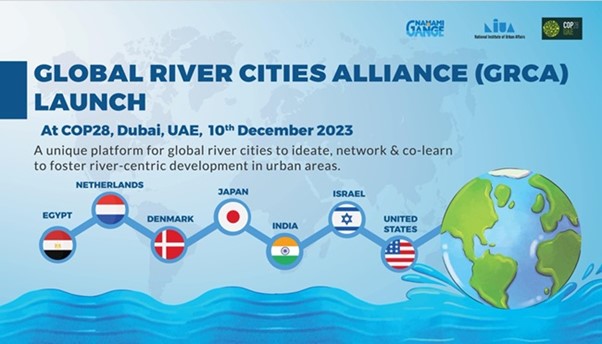
The Emissions Divide Report
- A recent study by the Council on Energy, Environment, and Water (CEEW) reveals significant disparities in carbon emissions between residents of developed and developing countries.
- The study highlights that many developed countries exhibit higher per capita carbon emissions than the richest 10% in developing nations like Argentina, Brazil, India, and the ASEAN region.
- The top 10% in developing countries, excluding Mexico and South Africa, emit nearly the same amount of carbon dioxide as individuals in the lower deciles of developed nations, including Australia, Canada, the United States, and Saudi Arabia.
- Individuals in the bottom 10% income bracket of developed countries have carbon footprints 6 to 15 times higher than those in the poorest decile of India, Brazil, or the ASEAN region.
- The study underscores the carbon emissions disparities even within income groups, emphasizing the complexity of the global carbon landscape.
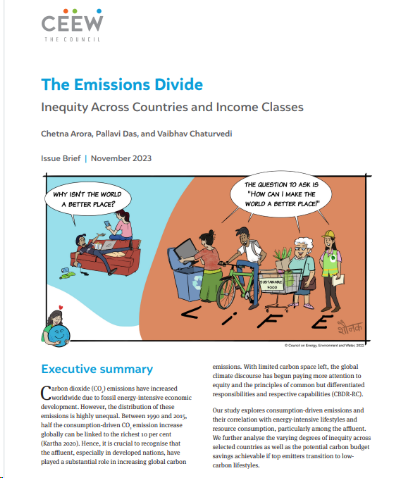
Blue Drop National Report 2023
- The Blue Drop National Report 2023 was released by the Department of Water and Sanitation on December 5, 2023.
- South Africa's drinking water quality has declined since 2014, with nearly half of it now declared microbiologically unsuitable for consumption.
- The study includes nine South African provinces, serving a total population of 48,486,567 people.
- A thorough examination of 958 water supply systems (WSS) spanning 144 water services authorities (WSA) looked at a variety of characteristics such as infrastructure condition, maintenance, operation, treatment procedures, monitoring, and personnel expertise.
- Auditors discovered that in 2023, 29% of WSS in 62 WSAs were in a critical state, up from 174 WSS in 33 WSAs in 2014.
- The overall number of essential systems has increased, indicating a concerning trend.
- The national Blue Drop Risk Rating rose from 52.3% in 2022 to 47.15% in 2023.
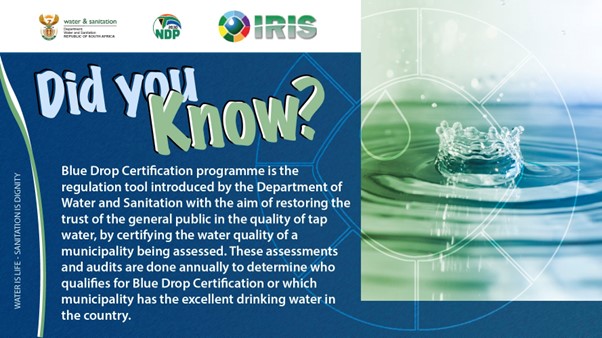
India Joins UN’s ‘Race to Resilience’
- India has taken a significant step towards addressing the challenges posed by climate change by joining the United Nations’ ‘Race to Resilience’ global campaign.
- This decision, announced during the recently concluded COP28 event in Dubai, reflects India’s commitment to building climate resilience in its urban areas.
- The ‘Race to Resilience’ is a worldwide platform that aims to unite non-state actors, investors, businesses, cities, regions, and civil society.
- The goal is to enhance the resilience of the most vulnerable communities to the impacts of climate change by 2030.
- Established in 2020, this campaign serves as a collaborative space to develop and implement strategies that mitigate climate-related risks and build resilient urban environments.
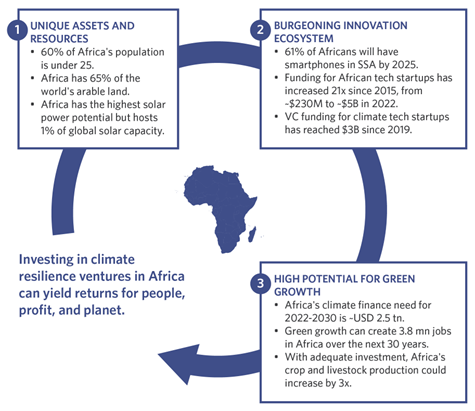
UAE Consensus
- For the first time, world leaders decided on a historic set of steps to take in order to reach the 1.5-degree Celsius goal at the COP28 Summit in Dubai.
- Endorsement of the ‘COP28 UAE Declaration on Agriculture, Food, & Climate’, is embedding sustainable agriculture and food systems in climate change responses.
- The ‘COP28 UAE Declaration on Climate and Health’, accelerates the development of climate-resilient, sustainable, and equitable health systems.
- The Global Decarbonization Accelerator (GDA) introduced initiatives such as the Global Renewables and Energy Efficiency Pledge and the Oil and Gas Decarbonization Charter.
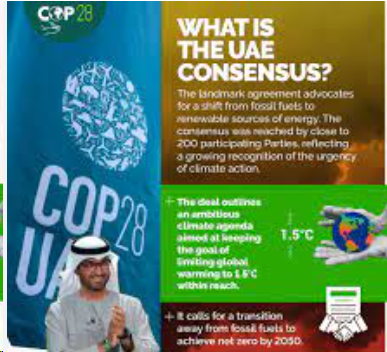
Pillar of Paris Agreement
- Fast-tracking a just energy transition.
- Fixing climate finance
- Focusing on people and nature.
- Fostering inclusivity in climate action.
- It is a comprehensive document that calls for a transition away from fossil fuels to achieve net zero by 2050.
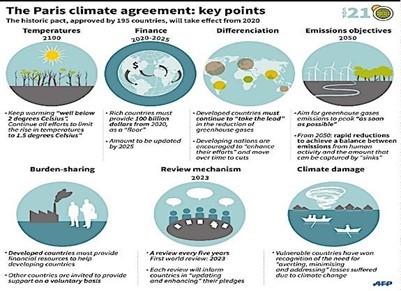
First global assessment on freshwater fish
- Climate change threatens a growing number of species, from freshwater fishes to Atlantic salmon and green turtles.
- It was according to the IUCN Red List of Threatened Species released at the COP28.
- The IUCN Red List now includes 157,190 species, of which 44,016 are threatened with extinction.
- This IUCN Red List update highlights the strong links between the climate and biodiversity crises, which must be tackled jointly.
- Species declines are an example of the havoc being wreaked by climate change.
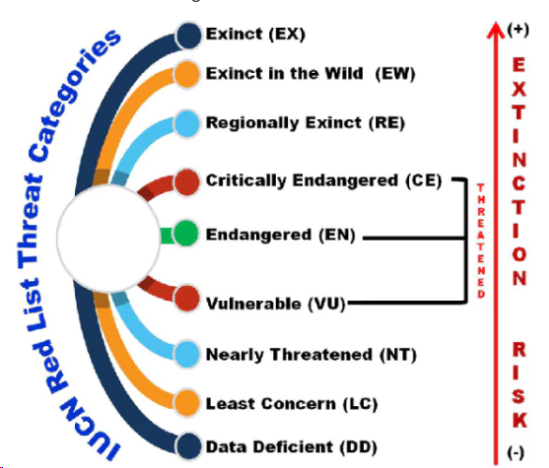
State of the world’s freshwater fish species
- It is the first comprehensive assessment of the world’s freshwater fish species.
- It is revealing that 25% (3,086 out of 14,898 assessed species) are at risk of extinction.
- At least 17% of threatened freshwater fish species are affected by climate change.
- It is including decreasing water levels, rising sea levels causing seawater to move up rivers, and shifting seasons.
- This compounds threats from pollution, which impacts 57% of freshwater fish species at risk of extinction, dams and water extraction, which affect 45%, overfishing, which threatens 25%, and invasive species and disease, which harm 33%.
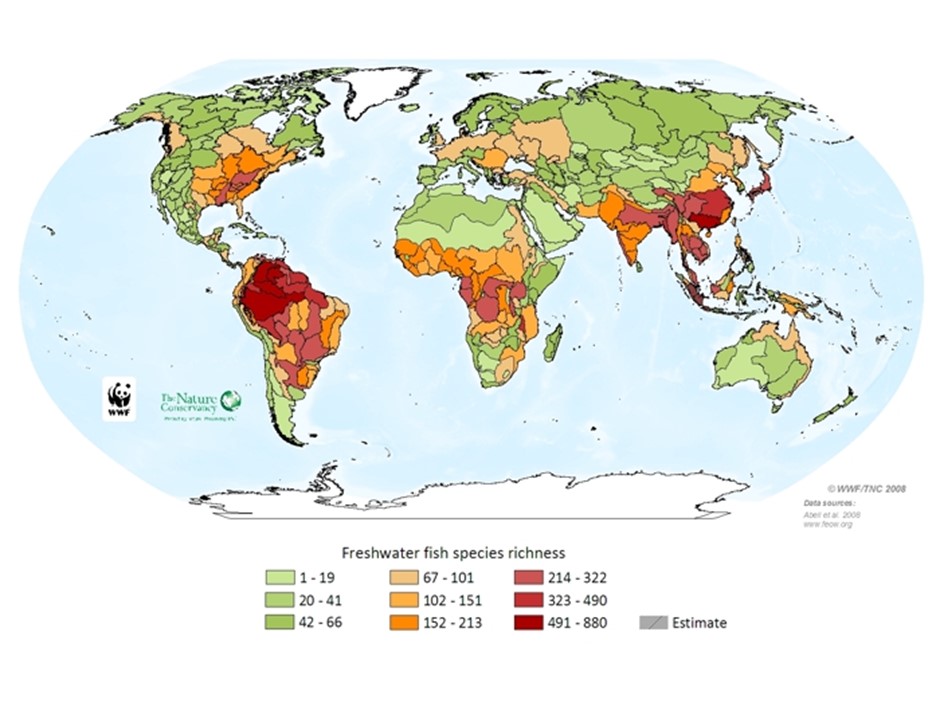
ENACT Partnership
- Six new countries and a United Nations agency are joining for the ENACT Partnership.
- The new partners include France, the United States of America, Belgium, the Netherlands, Switzerland, Pakistan, and the UN Environment Programme, including its World Conservation Monitoring Centre.
- ENACT Partnership is a global initiative.
- It seeks to coordinate global efforts to address climate change, land and ecosystem degradation, and biodiversity loss through Nature-based Solutions.
- Germany and Egypt, along with the International Union for Conservation of Nature launched ENACT (Enhancing Nature-based Solutions for an Accelerated Climate Transformation) at COP27
- COP27 took place at Sharm el-Sheikh, Egypt in December 2022.
- Canada, the European Union, Spain, Malawi, Norway, South Korea, Japan and Slovenia were also founding members of the partnership.
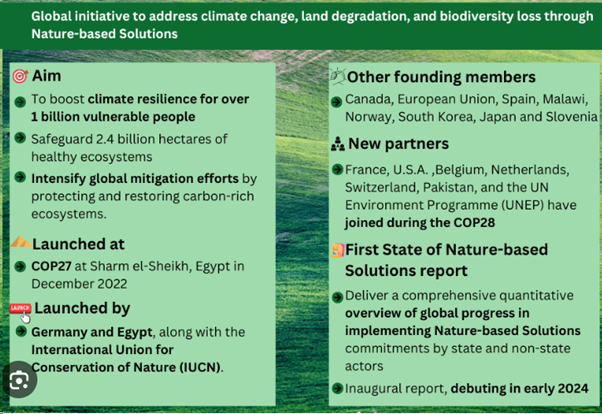
Declaration to Triple Nuclear Energy
- The declaration, launched at COP28, aims to triple global nuclear energy capacity by 2050.
- Endorsed by 22 national governments, the declaration calls for support from shareholders of international financial institutions.
- It encourages shareholders to advocate for the incorporation of nuclear energy in energy lending policies.
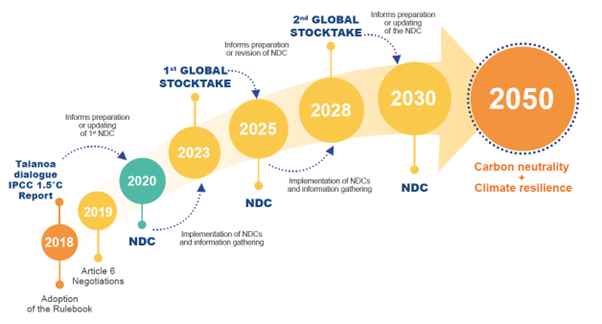
Powering Past Coal Alliance (PPCA)
- PPCA is a coalition of national and sub-national governments, businesses and organizations working to advance the transition from unabated coal power generation to clean energy.
- PPCA at COP28 welcomed new national and sub-national governments, and called for cleaner energy alternatives.
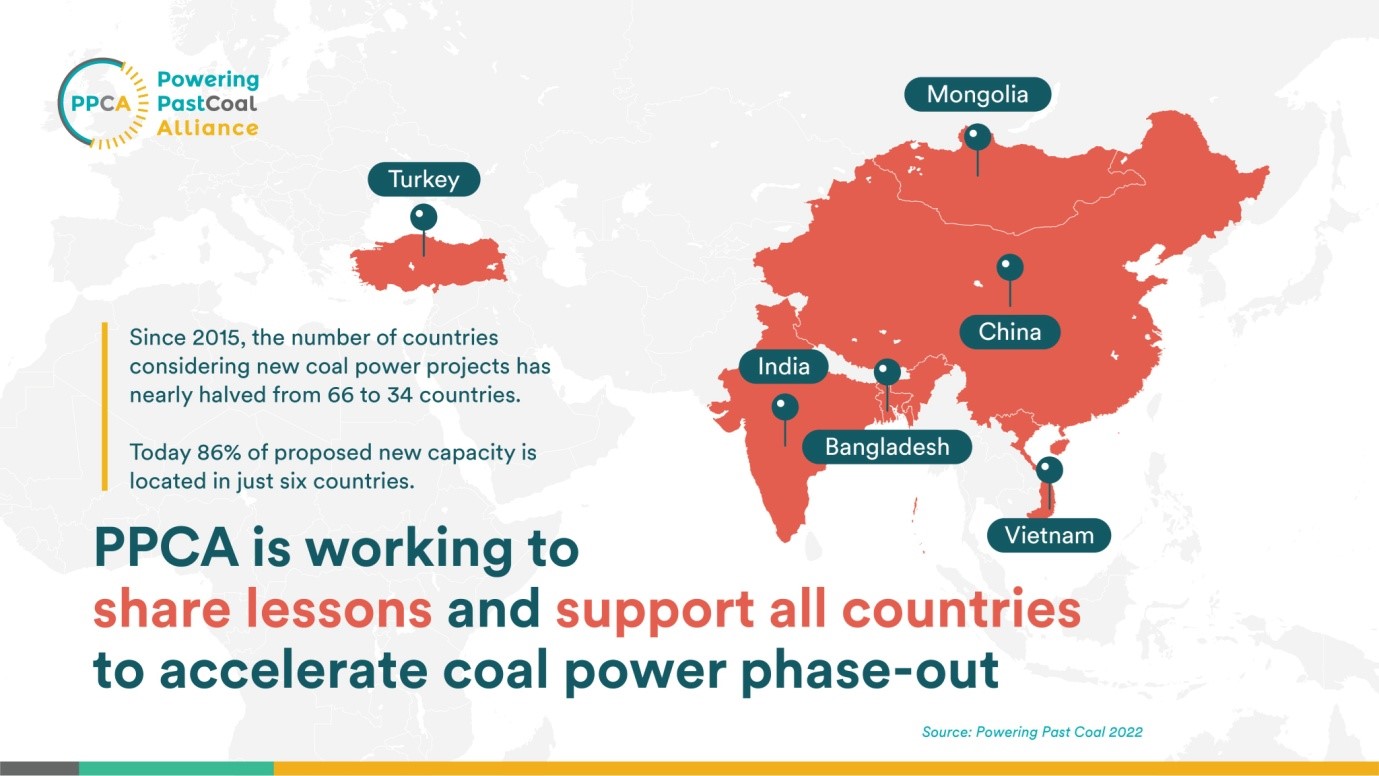
Other Initiatives of COP 28 - 4
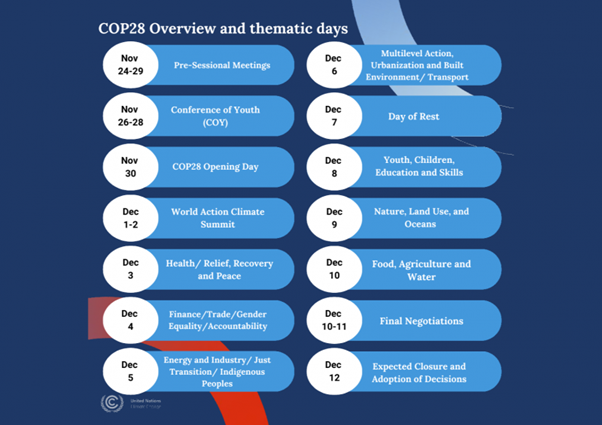
Global Stocktake Text
- The Global Stocktake (GST) is a periodic review mechanism.
- It is established under the Paris Agreement in 2015.
- The text proposes eight steps to keep the global temperature rise within the ambit of 1.5 degrees Celsius.
- It calls for tripling renewable energy capacity globally and doubling the global average annual rate of energy efficiency improvements by 2030.
- It is accelerating efforts towards the phase-down of unabated coal power.
- It is accelerating efforts globally towards net zero emissions energy systems, utilizing zero and low carbon fuels well before or by around mid-century.
- It is accelerating zero and low emissions technologies.
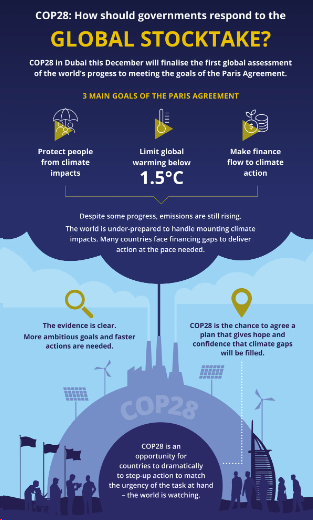
- It is including carbon capture and utilization and storage, and low carbon hydrogen production.
- It is to enhance efforts towards substitution of unabated fossil fuels in energy systems.
- Transitioning away from fossil fuels in energy systems is very important to achieve net zero by 2050.
- It will be accelerating and substantially reducing non-CO2 emissions.
- It is including cutting the methane emissions globally by 2030.
- It is accelerating emissions reductions from road transport through a range of pathways.
- It is including development of infrastructure and rapid deployment of zero and low emission vehicles.
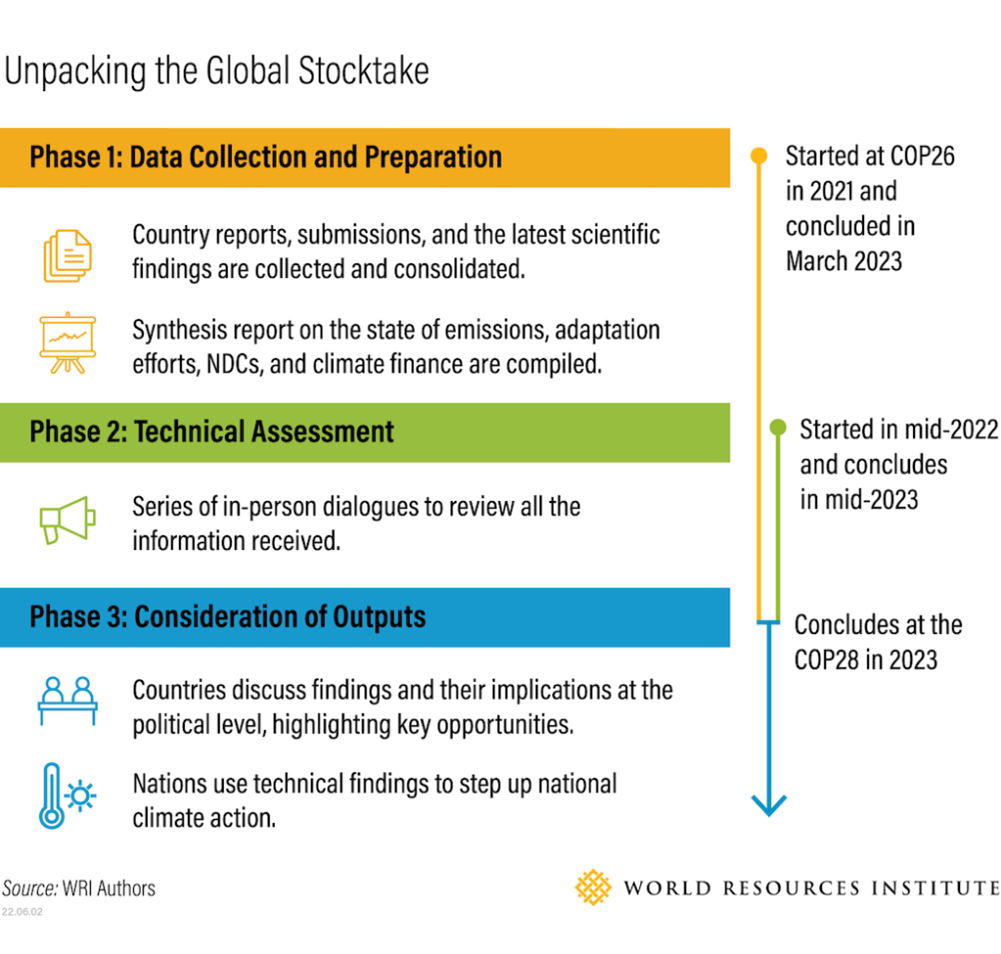
- It aims at phasing out of inefficient fossil fuel subsidies that encourage wasteful consumption.
- The inefficient fossil fuel subsidies will not address energy poverty or just transitions, as soon as possible.
- The fifth iteration text maintains continuity with COP26 in Glasgow.
- It was balancing global aspirations of countries like India with diverse energy needs.
Global Cooling Pledge
Joint initiative
- It was joint initiative by the United Arab Emirates as host of COP28 and the UNEP-led ‘Cool Coalition’.
- It is the world's first collective focus on energy emissions from the cooling sector.
Passive cooling strategies
- It outlines actions such as insulation, natural shading, ventilation and reflective surfaces, higher energy efficiency standards and a rapid phase down of climate-warming hydrofluorocarbon (HFC) refrigerants.
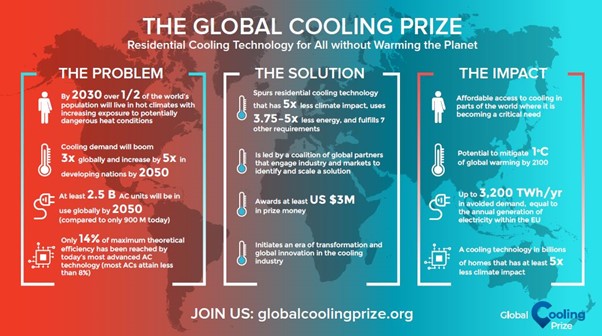
Aim
- It commits the countries to reduce their cooling emissions by at least 68% by 2050.
Outcome
- It could reduce the projected on 2050 emissions from business-as-usual cooling by around 3.8 billion tons of CO2 equivalent.
Santiago Network
- A collaborative framework, to assist vulnerable developing countries in managing climate-induced loss and damage, has been adopted.
- The Santiago Network was established at COP 25 in Madrid as part of the Warsaw International Mechanism for Loss and Damage (WIM).
- The network’s objective is to connect vulnerable developing countries with technical assistance, knowledge, and resources.
- The resources are needed to address climate risks, such as rising sea levels, melting glaciers, storms, and floods.
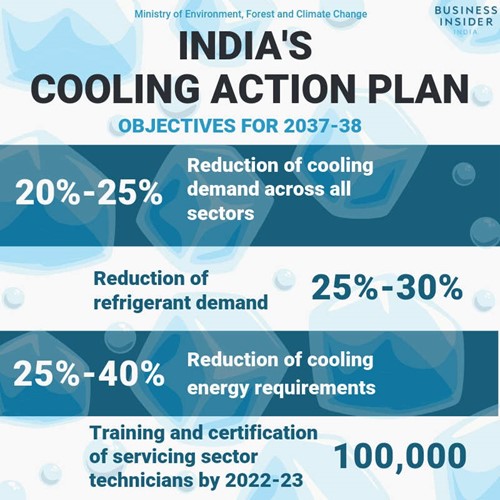
‘Green Rising’ Initiative
- India and UK, jointly announced a declaration on “one sun, one world, one grid” — or OSOWOG at the Conference of Parties (COP26), held in Glasgow, UK.
- GGI-OSOWOG was conceived in 2018 to develop global interconnected solar energy systems.
- Under the International Solar Alliance, India announced the launch of the Green Grids Initiative - One Sun, One World, One Grid (GGI-OSOWOG) in partnership with the United Kingdom.
- The vision behind the OSOWOG is ‘The Sun Never Sets’.
- It is a constant at some geographical location, globally, at any given point of time.
- The initiative aims to build a framework for global cooperation on the effective utilisation of renewable resources.
- It is ensuring that the clean and efficient energy is a reliable option for all nations to meet their energy requirements by 2030.
- This project aspires to harness the sun’s energy and build a global interconnected electricity grid to accelerate the transition to renewable energy.
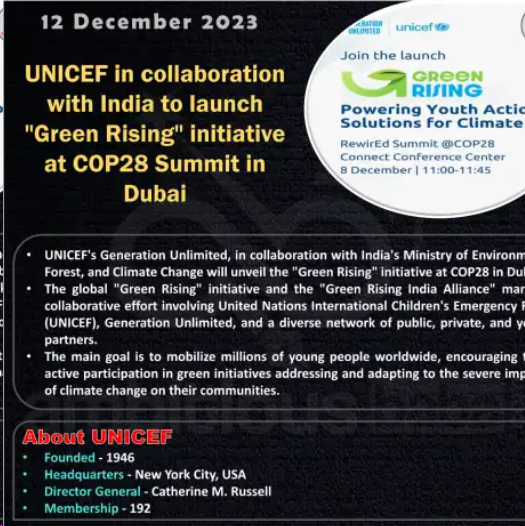
- This initiative focuses on engaging youth for impactful environmental actions at the grassroots level.
- It is aligning with the global effort to address the severe impacts of climate change.
- The global "Green Rising" initiative and the "Green Rising India Alliance" marks a collaborative effort involving UNICEF, Generation Unlimited, and a diverse network of public, private, and youth partners.
- The main goal is to mobilize millions of young people worldwide.
- It is encouraging their active participation in green initiatives addressing and adapting to the severe impacts of climate change on their communities.
- Through the YuWaah campaign in India, the focus is on engaging youth to drive impactful environmental actions at the grassroots level.
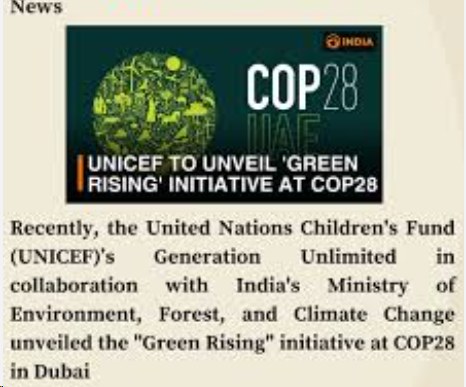
Official Launch of the Oil and Gas Decarbonization Charter

- COP28 President Dr. Sultan Al Jaber and the Kingdom of Saudi Arabia announced the official launch of the Oil and Gas Decarbonization Charter (OGDC).
- Oil and Gas Decarbonization Charter is a dedicated initiative for the oil and gas sector.
- It aims to induce substantial impact in addressing climate challenges.
- Currently, 50 companies, collectively responsible for over 40 percent of global oil production, have committed to the OGDC.
- National Oil Companies have shown historic participation.
- It is constituting over 60 percent of the total signatories.
- It is marking a noteworthy shift towards decarbonization within this sector.
- It is integral to the Global Decarbonization Accelerator (GDA).
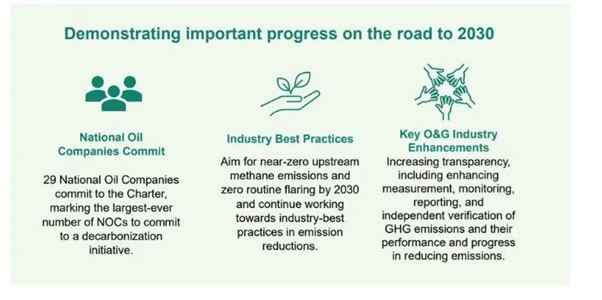
Global Cooling Watch 2023
- The Global Cooling Watch 2023 report by UNEP highlights pathways to achieve near-zero emissions from cooling.
- It focuses on three key measures
- Those are Passive cooling, higher-energy efficiency standards, and a faster phase-down of climate-warming refrigerants.
- Aligned with the Global Cooling Pledge, the report aims to reduce cooling-related emissions and promote sustainable cooling.
- It recommends incorporating these measures into building codes and utilizing financial instruments to drive demand for higher-efficiency products.
- A report from the Cool Coalition, released during COP28 climate talks, suggests that implementing the above-given measures could reduce predicted 2050 emissions from cooling by at least 60%.
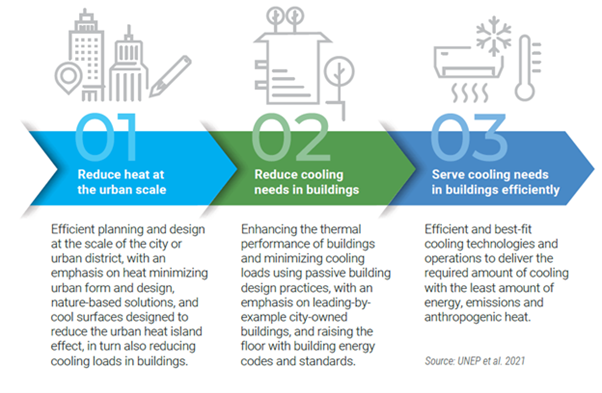
- If combined with rapid power grid decarbonization, these measures could result in up to a 96% reduction in emissions from the cooling sector.
- Previously, the United Nations Environment Programme’s Cool Coalition and COP28 host the United Arab Emirates introduced a Global cooling pledge (India had declined to sign the pledge)
- In 2016, over 150 countries signed the Kigali Amendment (including India) to the Montreal Protocol, agreeing to reduce HFC consumption by 80% by 2047.
- India Cooling Action Plan was launched in 2019.
- It seeks to reduce cooling demand across sectors by 20% to 25% by 2037-38, and refrigerant demand by 25% to 30% by 2037-38.
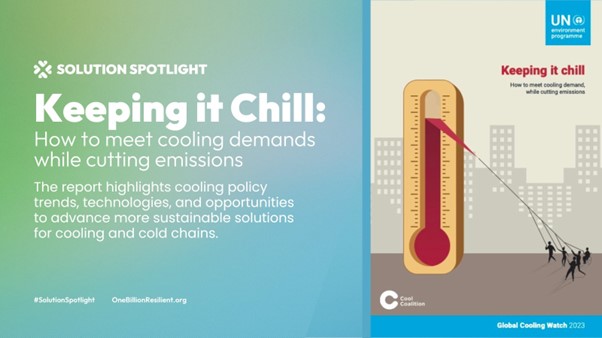
Article 6 Discussions at COP28
- The 28th Conference of Parties (COP) to the United Nations Framework Convention for Climate Change (UNFCCC) have seen both progress and challenges.
- The focus has been on refining rules and procedures for market approaches, with the aim of finalizing frameworks for Article 6.2, Article 6.4, and Article 6.8.
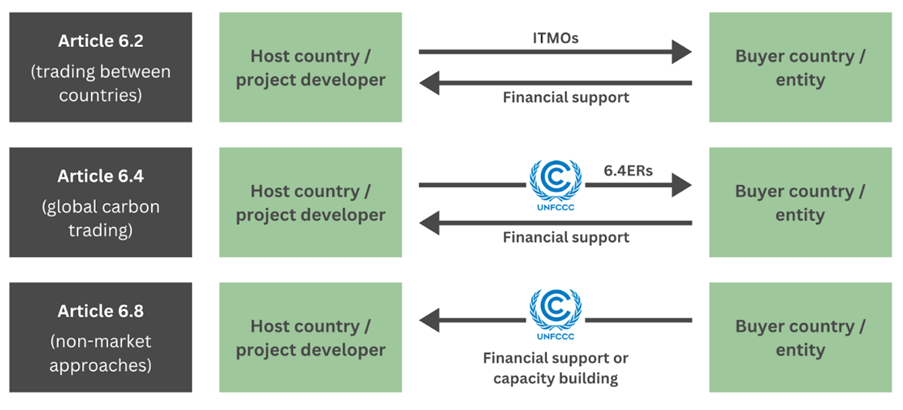
“State of Finance for Nature” Report
- A new United Nations report, “State of Finance for Nature,” reveals that countries invest nearly $7 trillion annually in subsidies and private investments with direct negative impacts on nature.
- This staggering figure accounts for 7% of the global gross domestic product.
- It is highlighting the urgent need for a shift in financial practices.
- The report was presented by the UN Environment Portal (UNEP) at the 28th Conference of Parties (COP28) to the United Nations Framework Convention on Climate Change.
- Launched on 8th December, 2023, the report analyzes private finance flows affecting nature negatively, providing unprecedented insights into the scale of the issue.
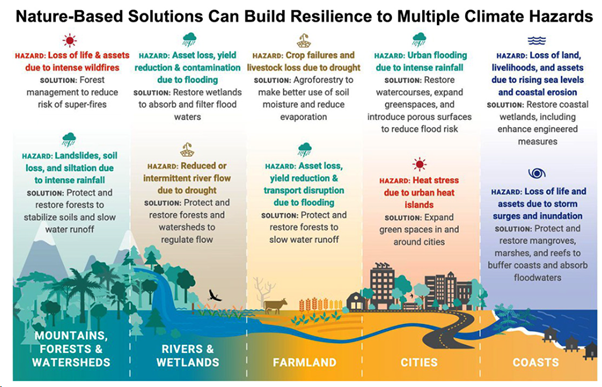
Global Climate Action - 7th Edition
- India has been ranked 7th in a report Climate Change Performance Index (CCPI) 2024, published on the sidelines of the ongoing COP28 at Dubai.
- The first three ranks in the ‘very high’ performance category are remained vacant.
- CCPI countries must have an emissions peak by 2025 to keep the 1.5°C goal in reach.
- The Climate Change Performance Index (CCPI) is an annual report.
- It has been prepared by Germanwatch, the New Climate Institute, and the Climate Action Network since 2005 with the involvement of nearly 450 climate and energy experts.
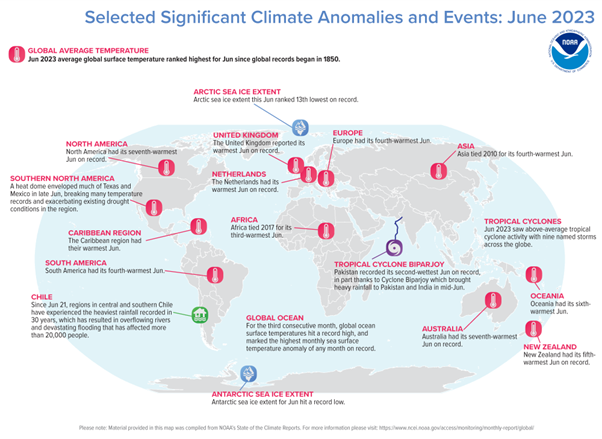
Other initiatives of COP 28 - 5
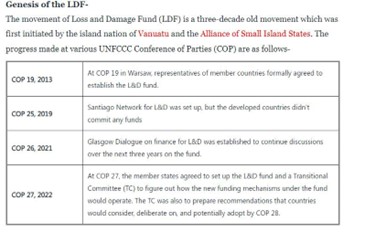
Coal Transition Accelerator
- France in collaboration with various countries and organizations, introduced the Coal Transition Accelerator.
- Its objectives include knowledge-sharing, policy design, and financial support to facilitate just transitions from coal to clean energy.
- The initiative aims to leverage best practices and lessons learned for effective coal transition policies.
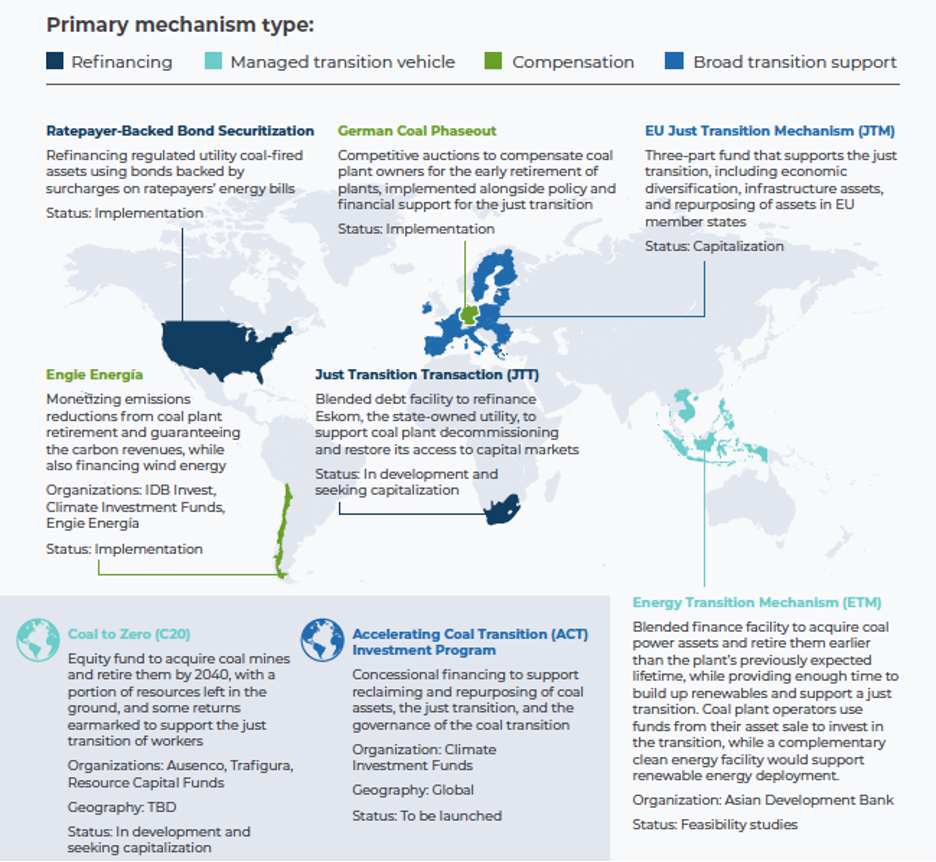
Coalition for High Ambition Multilevel Partnership (CHAMP)
- A total of 65 national governments signed the CHAMP commitments.
- It aims to enhance cooperation where applicable and appropriate, with sub-national governments in the planning, financing, implementation, and monitoring of climate strategies.
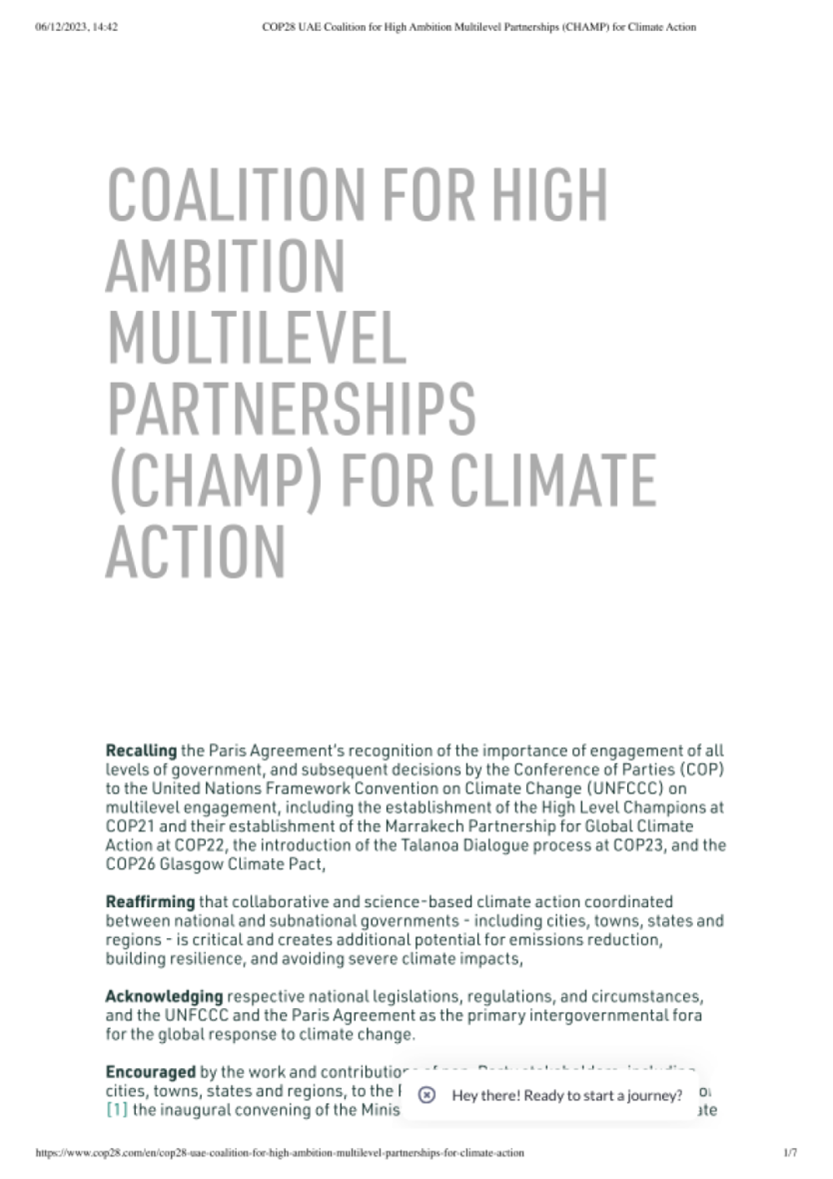
Buildings Breakthrough Initiative
- The Governments of France and Morocco, together with the UN Environment Programme (UNEP), launched the Buildings Breakthrough at COP28.
- It will see countries joining forces to accelerate the transformation of the construction sector.
- It was launched with a view to making near-zero emissions and climate resilient buildings the new normal by 2030.
- This sector alone accounts for 21 per cent of global greenhouse gas emissions.
- Twenty-seven countries have so far pledged their commitment to the Buildings Breakthrough.
- The Buildings Breakthrough is part of the Breakthrough Agenda through a coalition of leading public, private and public-private global initiatives.
- It provides a framework for countries, businesses and civil society to join up and strengthen their actions every year in key emitting sectors.
- The new initiative aims to strengthen international collaboration to decarbonize the building sector.
- It also aims to make clean technologies and sustainable solutions the most affordable, accessible and attractive option in all regions by 2030.
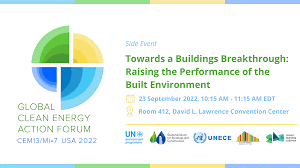
Methane Emissions and Net-Zero Plans
- The COP28 urged the oil and gas industry to completely eliminate methane emissions by 2030.
- The COP28 also asked to align their practices with net-zero emission plans by 2050.
- The COP28 also emphasized the imperative of reducing and ultimately eradicating the carbon intensity of hydrocarbon usage, even in the context of their ongoing worldwide utilization.
- Methane emissions rank among the leading contributors to global warming.
- While fossil fuel operations are accounting for more than one-third of all human-generated methane emissions.
- It was reported by the International Energy Agency (IEA).
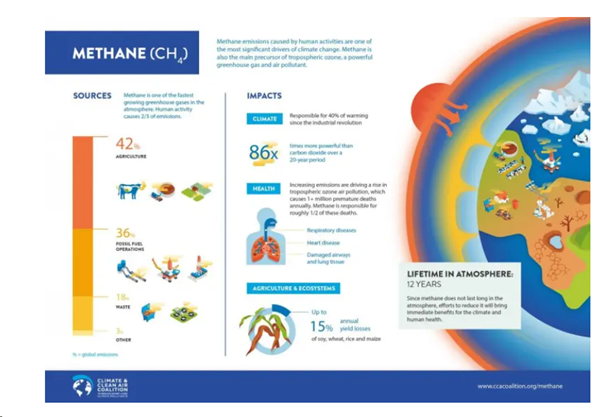
- Consequently, addressing methane is widely recognized as one of the most impactful actions.
- The energy sector can pursue these actions to combat climate change.
- COP28 marked the first time that the global commitment was made to transition away from oil and gas.
- It signals the “beginning of the end” of the fossil fuel era by laying the ground for a swift and equitable transition, underpinned by deep emissions cuts and scaled-up finance.
- In a demonstration of global solidarity, negotiators from nearly 200 Parties came together in Dubai with a decision on the world’s first ‘global stocktake’.
- It aims to ratchet up the climate action before the end of the decade.
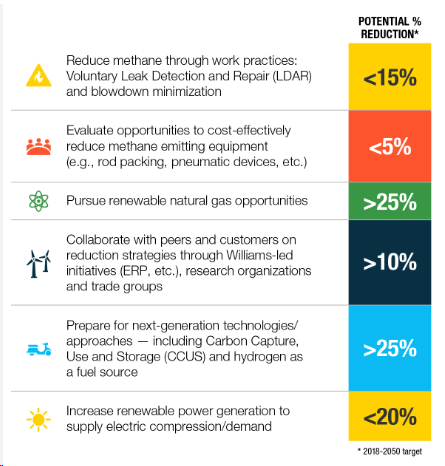
- It was launched with the overarching aim to keep the global temperature limit of 1.5°C within reach.
- Now all governments and businesses need to turn these pledges into real-economy outcomes, without delay.
- The global stocktake is considered the central outcome of COP28.
- It contains every element that was under negotiation and can now be used by countries to develop stronger climate action plans due by 2025.
- The stocktake recognizes the science that indicates global greenhouse gas emissions need to be cut 43% by 2030, compared to 2019 levels, to limit global warming to 1.5°C.
- But it notes Parties are off track when it comes to meeting their Paris Agreement goals.
- The stocktake calls on Parties to take actions towards achieving, a tripling of renewable energy capacity and doubling energy efficiency improvements by 2030 at a global scale.
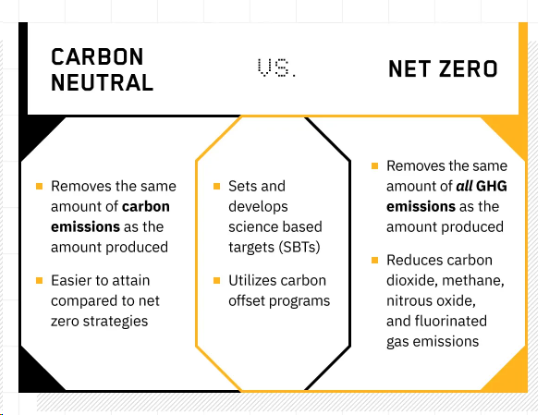
Phase-down of Unabated Coal
- There was a move to stipulate that no new coal-fired power plants could be opened without an in-built carbon capture and storage facility.
- But this was strongly resisted by India, China, South Africa, and other countries.
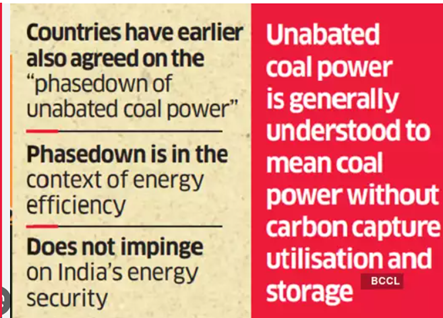
Global Expert Review on Debt, Nature, and Climate
- At the 28th Conference of Parties to the United Nations Framework Convention on Climate Change (COP 28), leaders from Kenya, Colombia and France launched the Global Expert Review on Debt, Nature and Climate.
- It was first proposed at the summit for a New Global Financing Pact in Paris in June this year.
- The announcement signals movement on spotlighting the issue of debt distress in the context of climate change.
- Kenya, Colombia and France have teamed up and launched a team of international experts to review financial architecture.
- The experts will review debt, climate and nature.
- The review is a follow-through of part of the Paris Pact for People and Planet agreed at the Summit for a New Global Financing Pact in Paris.
- The aim of the effort is to make structural economic transformation for low carbon economic growth.
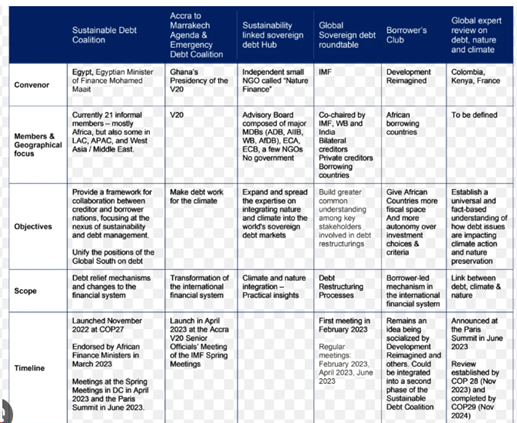
Watsonx.ai
- At the recent COP28, NASA and IBM announced that an Artificial Intelligence (AI) tool called watsonx.ai.
- It would be available on the open-source AI platform Hugging Space.
- The watsonx.ai is an Artificial Intelligence tool jointly built by IBM and NASA.
- It will help users monitor the Earth from space, measuring environmental changes.
- That changes have already happened while also making predictions about the future.
- The model is also designed to be extremely simple to use.
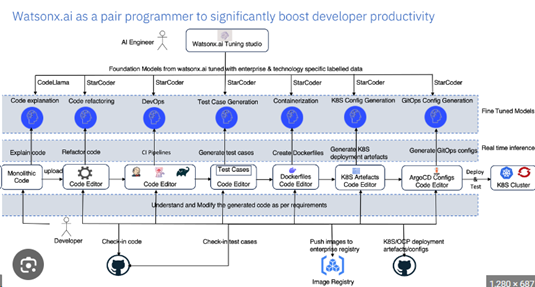
- In this, a user would merely need to select a location and a date.
- And the model will highlight changes in floodwater, reforestation efforts and other relevant factors.
- Watsonx.ai work is built on a foundation model.
- It was trained on a broad set of uncategorized data allowing.
- The model is to apply information about one situation to another.
- NASA provides the datasets and IBM created the foundation model to interpret them.
- In order to train the model to comprehend visual sequences that unfold over time, scientists filled in blank areas in each image and asked the model to piece it back together.
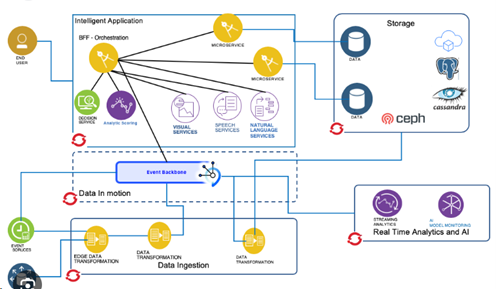
UN Climate Talks will be in Azerbaijan in 2024
- Azerbaijan is an Asian country.
- According to the recent announcement, the COP-29 climate change summit will be hosted by Azerbaijan.
- This announcement was made at the COP-28 climate change summit.
- The decision comes after Armenia withdrew its candidacy to host COP-29.
- COP means Conference of Parties.
- The COP is organized by the United Nations Framework Convention on Climate Change (UNFCCC).
- This convention’s secretariat is located in Bonn city of Germany.
- The first COP summit was held in Berlin in the year 1995.
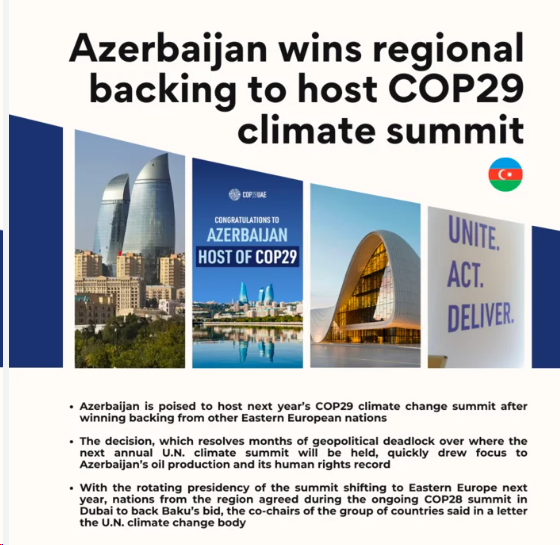
-------------------------------------


